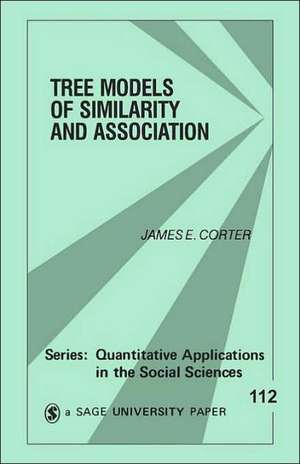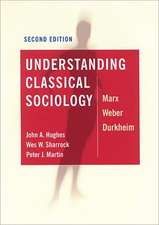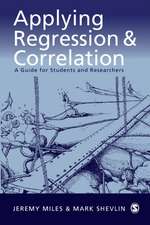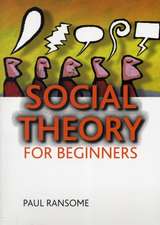Tree Models of Similarity and Association: Quantitative Applications in the Social Sciences, cartea 112
Autor James E. Corteren Limba Engleză Paperback – 29 mai 1996
Din seria Quantitative Applications in the Social Sciences
-
 Preț: 306.08 lei
Preț: 306.08 lei -
 Preț: 270.02 lei
Preț: 270.02 lei -
 Preț: 270.25 lei
Preț: 270.25 lei -
 Preț: 274.06 lei
Preț: 274.06 lei -
 Preț: 270.29 lei
Preț: 270.29 lei -
 Preț: 304.51 lei
Preț: 304.51 lei -
 Preț: 304.83 lei
Preț: 304.83 lei -
 Preț: 313.80 lei
Preț: 313.80 lei -
 Preț: 305.60 lei
Preț: 305.60 lei -
 Preț: 304.77 lei
Preț: 304.77 lei -
 Preț: 306.14 lei
Preț: 306.14 lei -
 Preț: 273.46 lei
Preț: 273.46 lei -
 Preț: 275.42 lei
Preț: 275.42 lei -
 Preț: 277.33 lei
Preț: 277.33 lei -
 Preț: 305.05 lei
Preț: 305.05 lei -
 Preț: 271.10 lei
Preț: 271.10 lei -
 Preț: 270.63 lei
Preț: 270.63 lei -
 Preț: 305.05 lei
Preț: 305.05 lei -
 Preț: 304.51 lei
Preț: 304.51 lei -
 Preț: 305.28 lei
Preț: 305.28 lei -
 Preț: 270.40 lei
Preț: 270.40 lei -
 Preț: 305.60 lei
Preț: 305.60 lei -
 Preț: 304.77 lei
Preț: 304.77 lei -
 Preț: 306.14 lei
Preț: 306.14 lei -
 Preț: 306.34 lei
Preț: 306.34 lei -
 Preț: 305.40 lei
Preț: 305.40 lei -
 Preț: 306.41 lei
Preț: 306.41 lei -
 Preț: 304.77 lei
Preț: 304.77 lei -
 Preț: 305.60 lei
Preț: 305.60 lei -
 Preț: 304.51 lei
Preț: 304.51 lei -
 Preț: 269.91 lei
Preț: 269.91 lei -
 Preț: 270.40 lei
Preț: 270.40 lei -
 Preț: 269.91 lei
Preț: 269.91 lei -
 Preț: 289.18 lei
Preț: 289.18 lei -
 Preț: 287.82 lei
Preț: 287.82 lei -
 Preț: 316.12 lei
Preț: 316.12 lei -
 Preț: 288.96 lei
Preț: 288.96 lei -
 Preț: 316.71 lei
Preț: 316.71 lei -
 Preț: 314.98 lei
Preț: 314.98 lei -
 Preț: 317.26 lei
Preț: 317.26 lei -
 Preț: 314.60 lei
Preț: 314.60 lei -
 Preț: 289.95 lei
Preț: 289.95 lei -
 Preț: 289.18 lei
Preț: 289.18 lei -
 Preț: 315.36 lei
Preț: 315.36 lei -
 Preț: 314.98 lei
Preț: 314.98 lei -
 Preț: 316.33 lei
Preț: 316.33 lei -
 Preț: 316.51 lei
Preț: 316.51 lei
Preț: 314.38 lei
Nou
Puncte Express: 472
Preț estimativ în valută:
60.16€ • 62.99$ • 49.90£
60.16€ • 62.99$ • 49.90£
Carte tipărită la comandă
Livrare economică 09-23 aprilie
Preluare comenzi: 021 569.72.76
Specificații
ISBN-13: 9780803957077
ISBN-10: 0803957076
Pagini: 72
Dimensiuni: 140 x 216 x 4 mm
Greutate: 0.09 kg
Ediția:1
Editura: SAGE Publications
Colecția Sage Publications, Inc
Seria Quantitative Applications in the Social Sciences
Locul publicării:Thousand Oaks, United States
ISBN-10: 0803957076
Pagini: 72
Dimensiuni: 140 x 216 x 4 mm
Greutate: 0.09 kg
Ediția:1
Editura: SAGE Publications
Colecția Sage Publications, Inc
Seria Quantitative Applications in the Social Sciences
Locul publicării:Thousand Oaks, United States
Cuprins
Introduction
Two Types of Tree Models
Algorithms for Fitting Trees to Data
Practical Issues and Applications
Some Extensions of Tree Models
Discussions and Conclusions
<i>Appendix A: Mathematical Programming</i>
<i>Appendix B: Availability of Software for Fitting Trees</i>
<i>Appendix C: Estimating Fit of a Tree Using Multiple Regression</i>
Two Types of Tree Models
Algorithms for Fitting Trees to Data
Practical Issues and Applications
Some Extensions of Tree Models
Discussions and Conclusions
<i>Appendix A: Mathematical Programming</i>
<i>Appendix B: Availability of Software for Fitting Trees</i>
<i>Appendix C: Estimating Fit of a Tree Using Multiple Regression</i>
Notă biografică
Scholarly Interests
Computational models of human learning and categorization. Judgment and decision-making. Clustering and scaling methods for multivariate data. Statistics expertise and probability problem-solving. Evaluation of educational technology innovations.
Computational models of human learning and categorization. Judgment and decision-making. Clustering and scaling methods for multivariate data. Statistics expertise and probability problem-solving. Evaluation of educational technology innovations.
Descriere
Clustering and tree models are being widely used in the social and biological sciences to analyze similarity relations. This volume describes how matrices of similarities or associations among entities can be modelled using trees, and explains some of the issues that arise in performing such analyses and interpreting the results correctly. James E Corter distinguishes ultrametric trees from additive trees and discusses how specific aspects of each type of tree can be interpreted through the use of applications as examples. He concludes with a discussion of when tree models might be preferable to spatial geometric models.












